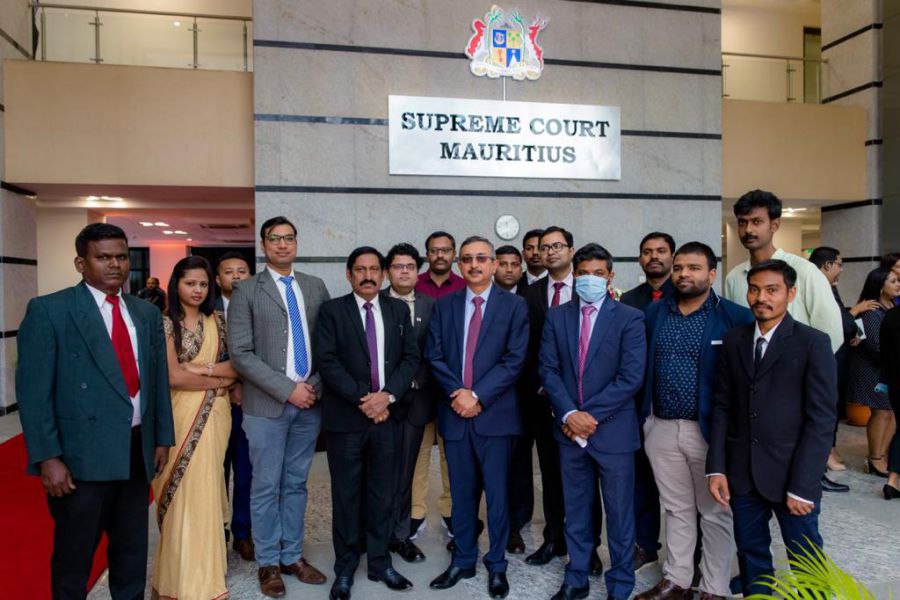Judicial Review Mauritius serves as a cornerstone of democracy, ensuring that the actions of government bodies are consistent with the law and the principles of justice. This mechanism allows courts to evaluate decisions made by the executive and legislative branches, ensuring that no authority exceeds its legal mandate. The importance of judicial review extends beyond technical legality—it shapes public trust, maintains institutional balance, and protects citizens’ fundamental rights.
Judicial Review Mauritius and the principle of checks and balances
The concept of checks and balances is central to the functioning of modern democratic systems. Judicial Review Mauritius embodies this principle by providing a legal framework through which the judiciary can monitor and correct actions by other branches of government. This ensures that no single branch becomes overly dominant, safeguarding both the legal order and democratic integrity. Courts assess whether decisions respect constitutional provisions, procedural fairness, and statutory requirements, reinforcing the accountability of public authorities.
Public confidence in the legal system is strengthened when citizens see that courts are willing to review decisions impartially. This framework discourages arbitrary or unlawful actions by government officials and reassures the public that there are mechanisms to correct potential abuses. Judicial Review Mauritius thereby contributes to a culture of transparency and responsibility, aligning national governance with democratic ideals and global standards of justice.
The impact of judicial oversight is particularly evident in high-profile cases where government decisions may affect civil liberties, social rights, or economic interests. By subjecting these decisions to judicial scrutiny, the system ensures that legality and fairness prevail over political expediency, fostering trust and long-term stability in governance.
Judicial Review Mauritius and the protection of citizens’ rights
One of the primary roles of Judicial Review Mauritius is to safeguard the rights of individuals against potential governmental overreach. Courts have the authority to annul or modify decisions that violate constitutional guarantees, ensuring that citizens are not subjected to unlawful or arbitrary actions. This protective function enhances the legitimacy of the legal system and strengthens the social contract between the government and its people.
Judicial scrutiny covers a wide range of administrative actions, from licensing and regulatory decisions to taxation and enforcement measures. By examining the legality and reasonableness of these actions, courts uphold principles of fairness and equity. This process is particularly important for marginalized groups, who rely on judicial oversight to protect their interests and secure equal treatment under the law.
Furthermore, the ability of the judiciary to enforce rights fosters public awareness and civic education. Citizens become more informed about their legal protections, which encourages engagement and accountability. Judicial Review Mauritius thus serves both as a guardian of rights and a catalyst for a more informed, active citizenry.
Judicial Review Mauritius and challenges to implementation
Despite its importance, Judicial Review Mauritius faces several challenges in practice. Limited resources, procedural delays, and complex legal frameworks can hinder the timely resolution of cases. Courts must navigate a delicate balance between ensuring comprehensive review and avoiding excessive interference in administrative discretion. This tension requires judicial prudence and a strong commitment to legal principles.
Another challenge involves the perception of judicial independence. Public confidence can be undermined if citizens believe that political pressure or personal influence affects judicial decisions. Maintaining a transparent and impartial judiciary is therefore essential to the credibility of Judicial Review Mauritius. Ongoing training, institutional safeguards, and clear procedural guidelines help address these concerns, ensuring that judicial oversight remains effective and trusted.
Moreover, the evolving complexity of government regulations and administrative practices necessitates continual adaptation of judicial review mechanisms. Courts must stay abreast of new policies, emerging legal issues, and international best practices to provide effective oversight. By confronting these challenges proactively, Judicial Review Mauritius strengthens its role as a cornerstone of legal governance.
Judicial Review Mauritius and the role of independent courts
Independent courts are the backbone of Judicial Review Mauritius. The effectiveness of judicial oversight depends on the judiciary’s ability to operate without external influence or interference. When courts maintain independence, they can evaluate government actions objectively, applying the law impartially and upholding the principles of justice. This independence ensures that the review process is not swayed by political considerations or public pressure.
Judicial independence is also critical for maintaining the rule of law. When citizens trust that courts act fairly, it reinforces respect for legal norms and reduces the likelihood of arbitrary governance. In Mauritius, efforts to protect judicial independence include constitutional safeguards, transparent appointment procedures, and institutional checks that prevent undue influence from other branches of government. These measures are essential for the credibility and authority of Judicial Review Mauritius.
Furthermore, independent courts play a vital role in complex or sensitive cases involving government policy, administrative discretion, or human rights. Their decisions set precedents, guide public officials, and clarify legal boundaries. By exercising judicial review independently, courts contribute to a culture of accountability, deter potential misuse of power, and strengthen the democratic fabric of the nation.
Judicial Review Mauritius and accountability mechanisms
Accountability is a central goal of Judicial Review Mauritius. Courts scrutinize government decisions, ensuring that authorities comply with legal standards and act responsibly. This oversight is essential for preventing abuse of power, arbitrary decision-making, and corruption. By holding government actors accountable, judicial review fosters transparency and reinforces public confidence in governance.
Effective accountability mechanisms also provide guidance for public institutions. When courts identify procedural errors, legal violations, or gaps in governance, their rulings offer actionable recommendations. Authorities can then adapt policies, improve compliance, and enhance administrative practices. This iterative process of review and correction strengthens both institutions and the rule of law, illustrating the practical value of Judicial Review Mauritius.
In addition, judicial review empowers citizens by giving them a venue to challenge decisions that affect their rights or interests. Through access to courts, individuals can seek redress, demand explanations, and ensure that authorities act within their legal mandate. This system of checks reinforces accountability at every level of government and demonstrates the judiciary’s crucial role in maintaining democratic integrity.
Judicial Review Mauritius and public perception
The effectiveness of Judicial Review Mauritius is closely tied to public perception. Citizens must trust that the judiciary operates independently, impartially, and competently. When the public perceives judicial review as fair and effective, it strengthens overall confidence in government institutions and the legal system. Conversely, doubts about impartiality or effectiveness can erode trust and reduce compliance with laws and regulations.
Media coverage, civic engagement, and transparency initiatives play a key role in shaping public perception. By communicating court decisions clearly, explaining the reasoning behind rulings, and highlighting the legal principles applied, authorities can reinforce confidence in Judicial Review Mauritius. Public awareness also encourages informed debate, civic participation, and accountability, creating a positive feedback loop that supports democratic governance.
Ultimately, maintaining a strong, credible, and trusted judicial review system requires consistent performance, clear communication, and ongoing engagement with citizens. Judicial Review Mauritius not only resolves legal disputes but also sustains public faith in the fairness and integrity of national governance.
Judicial Review Mauritius and citizen empowerment
Judicial Review Mauritius empowers citizens by providing a legal avenue to challenge decisions that affect their rights, freedoms, or interests. When individuals can access courts to review administrative actions, they are able to hold authorities accountable and demand explanations. This empowerment is fundamental to democratic governance, as it ensures that power is exercised responsibly and transparently.
Access to judicial review also promotes civic awareness. Citizens become more informed about their legal rights, the limits of governmental authority, and the mechanisms available to seek redress. Public education on judicial review processes enhances participation in civic life and strengthens the social contract, reinforcing the principle that everyone is subject to the law, including government officials.
Engaging citizens in this way builds trust in the judicial system. The visibility of decisions and the ability for individuals to seek justice contribute to a sense of fairness and equity. For additional perspectives and public debates on governance and accountability, readers can explore related discussions at Public Opinion Mauritius.
Judicial Review Mauritius and transparency in government
Transparency is a key objective of Judicial Review Mauritius. By scrutinizing government actions, courts make processes more open and understandable to the public. When judicial reasoning is communicated clearly, citizens gain insight into how decisions are made and why certain policies or administrative measures are approved or overturned. This transparency reinforces confidence in both the judiciary and public institutions.
Courts can also encourage transparency within government bodies by identifying gaps, procedural flaws, or areas of potential misconduct. Recommendations and rulings often lead to improvements in administrative practices, ensuring that decision-making processes are accountable and well-documented. This proactive role of the judiciary supports better governance and minimizes opportunities for arbitrary actions.
For international standards and best practices related to judicial transparency, authoritative resources such as Transparency International provide valuable insights. Aligning domestic practices with global benchmarks enhances credibility and fosters trust among both citizens and investors.
Judicial Review Mauritius and the balance of power
Maintaining a balance of power is central to the purpose of Judicial Review Mauritius. Courts act as an essential check on executive and legislative authorities, preventing overreach and ensuring that decisions comply with the constitution and statutory law. This balance is critical for sustaining democratic institutions and preventing the concentration of power in any single branch of government.
Through judicial review, authorities are reminded of the legal boundaries of their actions. Courts provide guidance on interpreting laws and applying regulations, clarifying the limits of authority while promoting responsible governance. This system of checks preserves institutional integrity, deters misuse of power, and strengthens the framework of rule of law.
By maintaining equilibrium among branches of government, Judicial Review Mauritius safeguards democratic principles and fosters a climate where public administration operates within clear legal parameters. It ensures that all governmental actors are accountable and that citizens’ rights remain protected.
Judicial Review Mauritius and restoring public trust
Public trust is the ultimate objective reinforced by Judicial Review Mauritius. Citizens expect impartiality, fairness, and clarity in judicial oversight. By demonstrating consistent enforcement of laws and accountability, the judiciary helps restore confidence in governance and assures the public that decisions are made according to principles of justice.
Rebuilding trust requires not only impartial rulings but also effective communication with citizens. Engaging civil society, media, and independent institutions ensures transparency and provides reassurance that the judicial system functions effectively. Over time, this strengthens the social contract and reinforces the legitimacy of governance mechanisms.
In conclusion, Judicial Review Mauritius plays a vital role in ensuring accountability, protecting citizens’ rights, maintaining checks and balances, and fostering transparency. By empowering citizens, reinforcing institutional integrity, and upholding the rule of law, judicial review strengthens democracy and restores public trust. Readers interested in ongoing discussions about governance and citizen perspectives can follow Public Opinion Mauritius for diverse insights, while Transparency International provides global guidance on standards of transparency and accountability.




